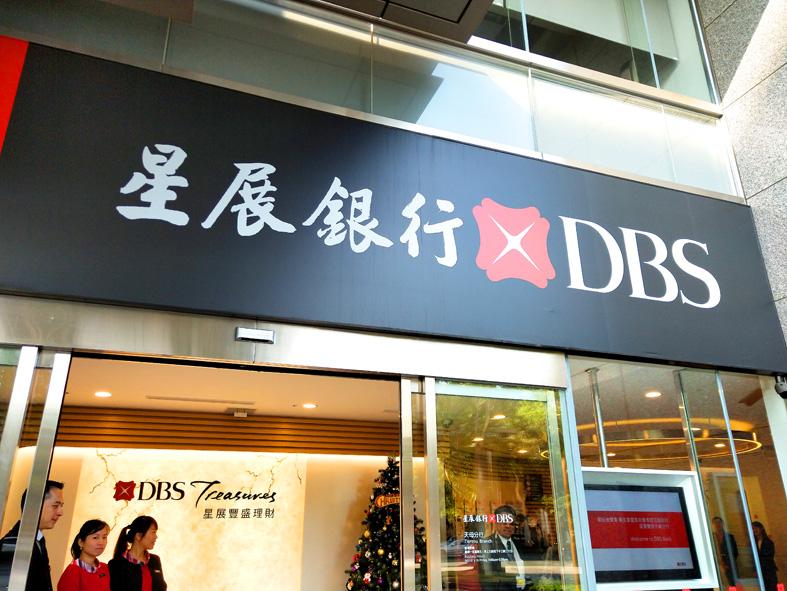DBS Bank Taiwan (星展銀行) has provided a two-year sustainability-linked loan (SLL) worth NT$1 billion (US$35.05 million) to Wistron Corp (緯創), with the loan’s interest rate set to fall next year at the soonest if Wistron’s sustainability performance improves, the lender said on Wednesday.
That marked DBS Taiwan’s second major sustainability-linked loan after a NT$2 billion loan to AU Optronics Corp (AUO, 友達光電) in 2019.
Similar to its loan arrangement with AUO, DBS Taiwan would lower the interest rate on Wistron’s loan if the debtor reaches several targets regarding environmental, social and governance (ESG) practice.

Photo: Lee Chin-hui, Taipei Times
The targets were set by DBS after discussions with the debtor, the bank said.
DBS would assign third-party institutions to review the contract electronics maker’s ESG practice based on the firm’s corporate social responsibility report this year.
If the results of the review indicate that the targets have been achieved, the interest rate would be reduced next year at the earliest, the bank said.
“We hope to provide an effective incentive for companies to advance their ESG programs,” DBS head of institutional banking group Tony Luo (羅綸有) said in a statement.
Wistron, whose products include handsets, servers, laptops, PCs, tablets, video game consoles and LCD modules, ranked among the top 5 percent in the Taiwan Stock Exchange’s corporate governance evaluation, the bank added.
DBS did not reveal the targets for Wistron, citing confidentiality agreements.
However, according to the Financial Supervisory Commission, an SLL approval should be tied to a debtor’s practices in environmental protection, social welfare, or corporate governance, such as greenhouse gas reduction, waste management, water efficiency and food security.
“It has been a global trend to balance business and sustainable development.” DBS Taiwan general manager Lim Him Chuan (林鑫川) said in a statement.
DBS Taiwan’s parent company, DBS Bank Ltd, has raised its sustainable finance target to S$50 billion (US$37.2 billion) by 2024, accelerating its sustainability agenda of helping clients incorporate sustainable business practices into their overall business strategy, Lim said.
DBS Taiwan was the first bank in the nation to issue an SLL, followed by HSBC Bank (Taiwan) Ltd (匯豐台灣商銀) and Taipei Fubon Commercial Bank (台北富邦銀行).
The former offered the loans to Taya Group (大亞集團) and Sinbon Electronics Co (信邦電子) last year, while the latter provided financing to Merry Electronics Co (美律實業) earlier this year.
Overall, the sustainable finance market in Taiwan is growing, albeit at an early stage, compared with green finance or regular finance, commission data showed.

Taiwan Semiconductor Manufacturing Co (TSMC, 台積電), the world’s biggest contract chipmaker, booked its first-ever profit from its Arizona subsidiary in the first half of this year, four years after operations began, a company financial statement showed. Wholly owned by TSMC, the Arizona unit contributed NT$4.52 billion (US$150.1 million) in net profit, compared with a loss of NT$4.34 billion a year earlier, the statement showed. The company attributed the turnaround to strong market demand and high factory utilization. The Arizona unit counts Apple Inc, Nvidia Corp and Advanced Micro Devices Inc among its major customers. The firm’s first fab in Arizona began high-volume production

VOTE OF CONFIDENCE: The Japanese company is adding Intel to an investment portfolio that includes artificial intelligence linchpins Nvidia Corp and TSMC Softbank Group Corp agreed to buy US$2 billion of Intel Corp stock, a surprise deal to shore up a struggling US name while boosting its own chip ambitions. The Japanese company, which is adding Intel to an investment portfolio that includes artificial intelligence (AI) linchpins Nvidia Corp and Taiwan Semiconductor Manufacturing Co (TSMC, 台積電), is to pay US$23 a share — a small discount to Intel’s last close. Shares of the US chipmaker, which would issue new stock to Softbank, surged more than 5 percent in after-hours trading. Softbank’s stock fell as much as 5.4 percent on Tuesday in Tokyo, its

COLLABORATION: Softbank would supply manufacturing gear to the factory, and a joint venture would make AI data center equipment, Young Liu said Hon Hai Precision Industry Co (鴻海精密) would operate a US factory owned by Softbank Group Corp, setting up what is in the running to be the first manufacturing site in the Japanese company’s US$500 billion Stargate venture with OpenAI and Oracle Corp. Softbank is acquiring Hon Hai’s electric-vehicle plant in Ohio, but the Taiwanese company would continue to run the complex after turning it into an artificial intelligence (AI) server production plant, Hon Hai chairman Young Liu (劉揚偉) said yesterday. Softbank would supply manufacturing gear to the factory, and a joint venture between the two companies would make AI data

The Taiwan Automation Intelligence and Robot Show, which is to be held from Wednesday to Saturday at the Taipei Nangang Exhibition Center, would showcase the latest in artificial intelligence (AI)-driven robotics and automation technologies, the organizer said yesterday. The event would highlight applications in smart manufacturing, as well as information and communications technology, the Taiwan Automation Intelligence and Robotics Association said. More than 1,000 companies are to display innovations in semiconductors, electromechanics, industrial automation and intelligent manufacturing, it said in a news release. Visitors can explore automated guided vehicles, 3D machine vision systems and AI-powered applications at the show, along